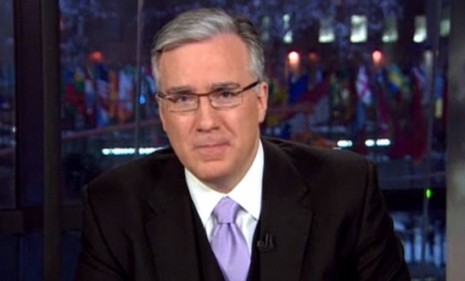Why Keith Olbermann left MSNBC: 5 theories
Liberal talk-show host Olbermann abruptly parted ways with MSNBC on Friday, stunning his audience and commentators alike. What happened?

A free daily email with the biggest news stories of the day – and the best features from TheWeek.com
You are now subscribed
Your newsletter sign-up was successful
MSNBC star Keith Olbermann shocked his viewers, the pundits, and apparently his own staff by announcing on Friday that he was leaving the network, effective at the end of his broadcast. (Watch Olbermann's farewell.) MSNBC's parent company, NBC Universal, declined to give a reason for Olbermann's departure, and the host's exit agreement reportedly bars him from discussing what happened, which has only fed the rampant speculation. Here, five theories on why Olbermann left.
1. Comcast's purchase of NBC forced him out
NBC Universal's merger with Comcast just got cleared by the FCC and, while Comcast swears it had nothing to do with Olbermann's exit, say Nikki Finke and Nellie Andreeva at Deadline, "word has been circulating for months now that the new owners have wanted to 'tinker' with MSNBC" by making it more conservative. That made Olbermann "very problematic." He certainly worried, "perhaps justifiably so, that his wings might be clipped," says "Countdown" fill-in host David Shuster on CNN. More media consolidation by "cranky old white billionaires," says Juan Cole in Informed Comment, means that cable TV will see fewer voices like Olbermann's.
The Week
Escape your echo chamber. Get the facts behind the news, plus analysis from multiple perspectives.

Sign up for The Week's Free Newsletters
From our morning news briefing to a weekly Good News Newsletter, get the best of The Week delivered directly to your inbox.
From our morning news briefing to a weekly Good News Newsletter, get the best of The Week delivered directly to your inbox.
2. Olbermann cut a "secret" exit deal
With the Comcast deal on the horizon, Olbermann "saw the handwriting on the wall" weeks ago, so he started negotiating a "secret deal" to get bought out of his contract, say the editors of TMZ. Reportedly, Olbermann's new agent asked for more money, insisting that $7 million a year was insufficient compensation for the host of MSNBC's most viewed show. NBC balked, knowing that Comcast didn't want "loose cannon" Olbermann anyway, so they cut him an exit deal "that will give him money and options."
3. He's taking on The Huffington Post
This isn't about Comcast, say Dominic Patten and Sharon Waxman in The Wrap. Olbermann has long been talking about leaving. In fact, a source says that Olbermann "really has his eye on creating his own media empire in the style of Huffington Post." The benefits of going it alone are that "Olbermann would control his own brand and, in his view, potentially earn far more as an owner." Yeah, "good luck with that" last part, says James Joyner in Outside the Beltway. "Olbermann is a huge brand — certainly more so than Arianna Huffington, David Frum, or Tucker Carlson... But it's going to be hard to top $7 million a year running a website."
A free daily email with the biggest news stories of the day – and the best features from TheWeek.com
4. MSNBC tired of his leftist "pontificating"
Olbermann didn't leave — he was "unceremoniously dumped" by MSNBC, say Michael Shain and Todd Venezia in the New York Post. Rather than keep the "garrulous gasbag" on the air, NBC brass "basically paid the pontificating pundit to scram." That wouldn't be too much of a surprise, since "Olbermann had butted heads with his superiors long before the Comcast deal," says Bill Carter in The New York Times. NBC had "been close to firing" the host in the past, "most recently in November after he revealed that he had made donations to several Democratic candidates in 2010."
5. Olbermann tired of NBC's interference
An MSNBC source insists that "leaving was all Keith's choice," say Nikki Finke and Nellie Andreeva at Deadline. It wouldn't be the first time, says Danny Gallagher at TV Squad. Olbermann's no stranger to confrontations, but "nothing matches the heated shouting matches and unnecessary vitriolic rhetoric [of] the debates he's had with his former bosses." When Olbermann came back from his brief suspension in November and didn't apologize for violating company policy, it was "a sure sign that, as they say on 'Behind the Music,' 'that's when things fell apart.'"
-
 The mystery of flight MH370
The mystery of flight MH370The Explainer In 2014, the passenger plane vanished without trace. Twelve years on, a new operation is under way to find the wreckage of the doomed airliner
-
 5 royally funny cartoons about the former prince Andrew’s arrest
5 royally funny cartoons about the former prince Andrew’s arrestCartoons Artists take on falling from grace, kingly manners, and more
-
 The identical twins derailing a French murder trial
The identical twins derailing a French murder trialUnder The Radar Police are unable to tell which suspect’s DNA is on the weapon